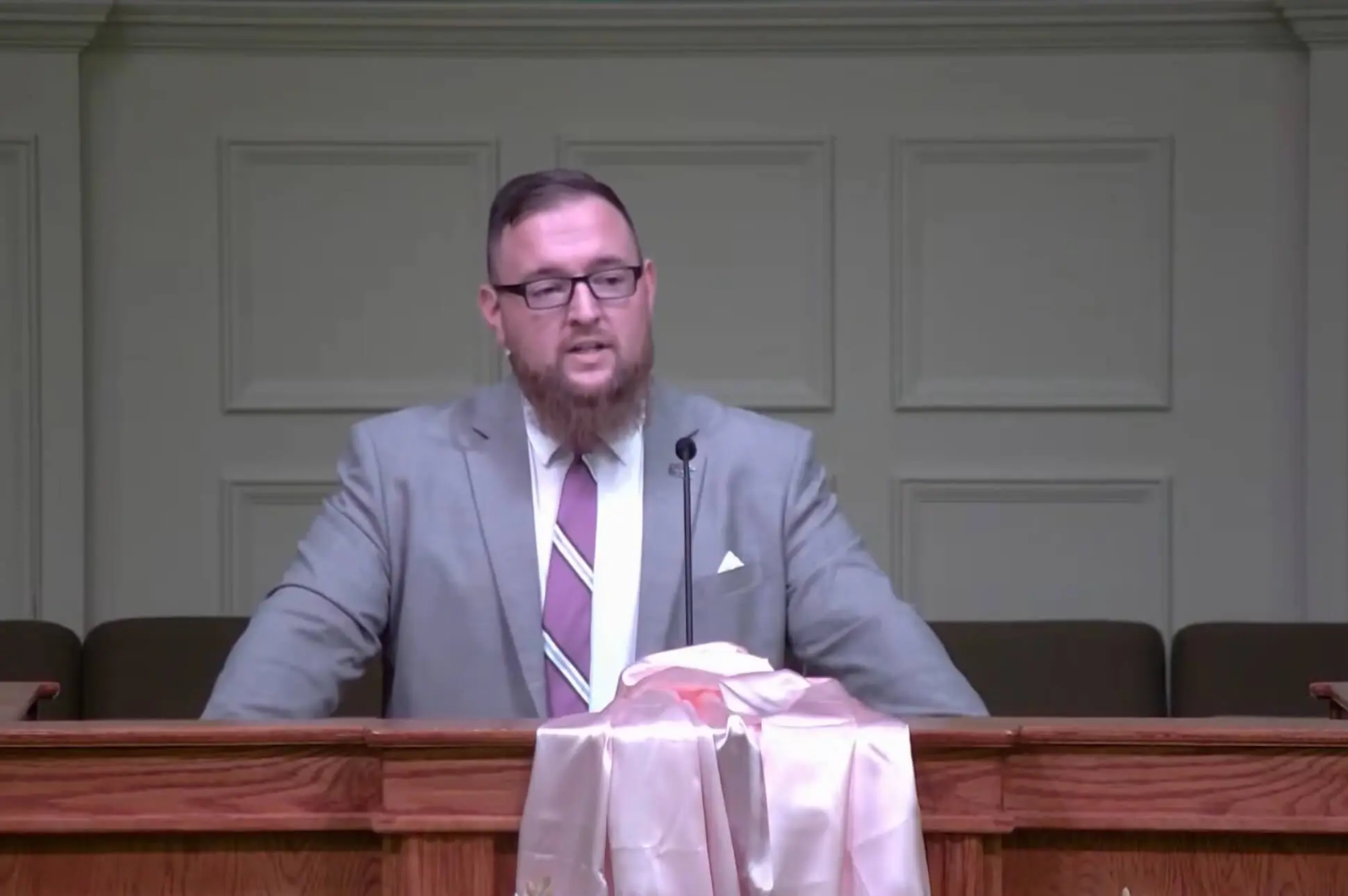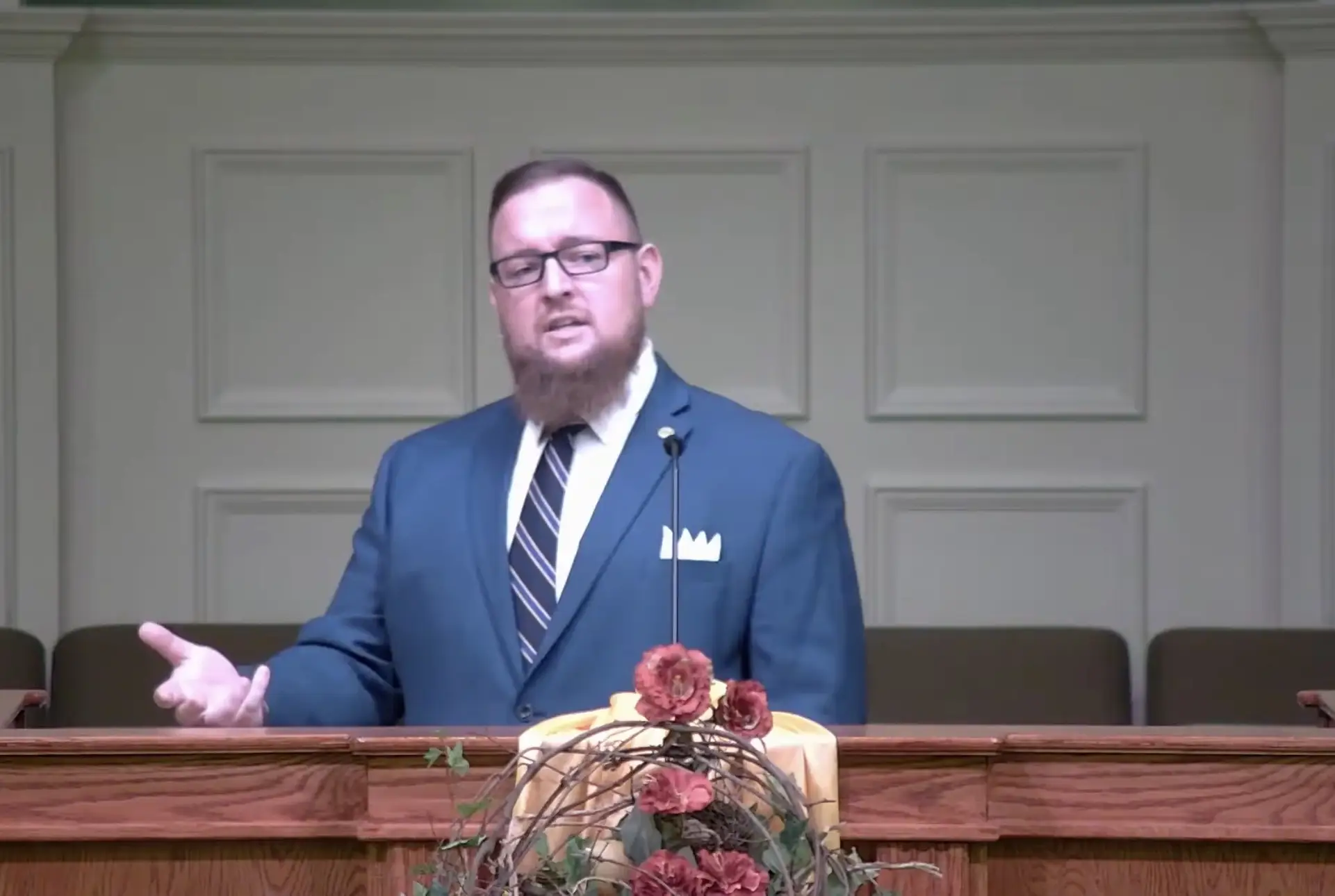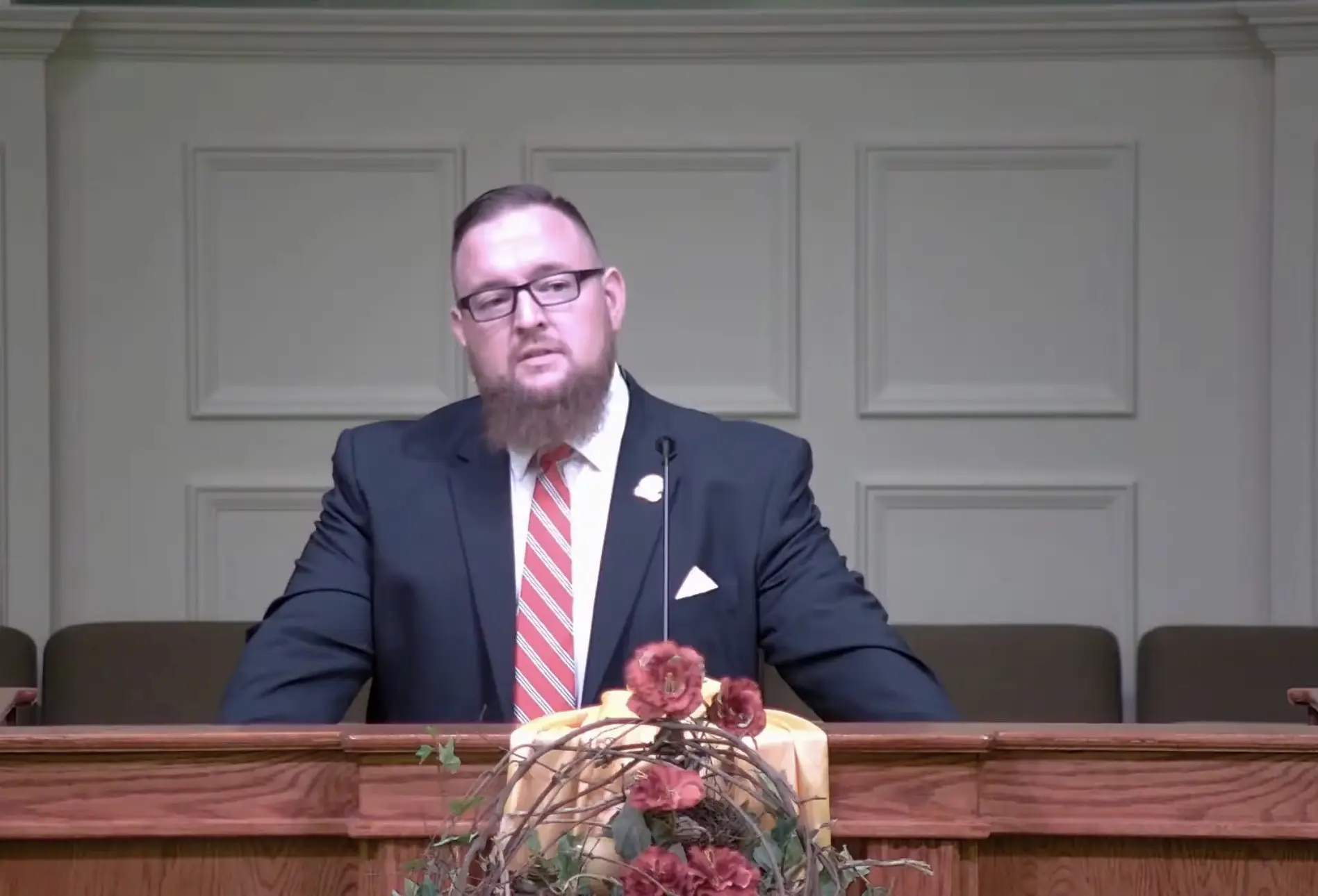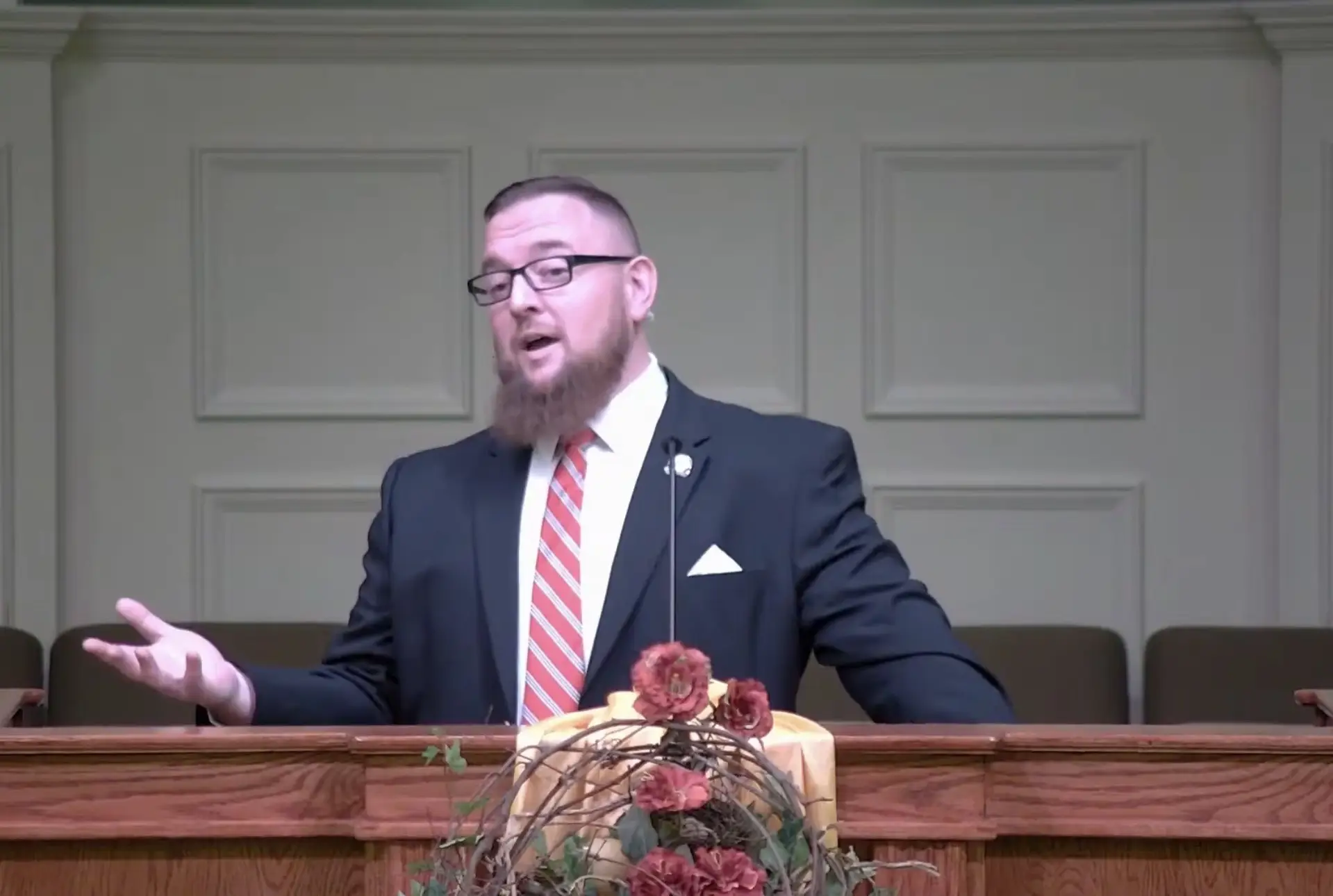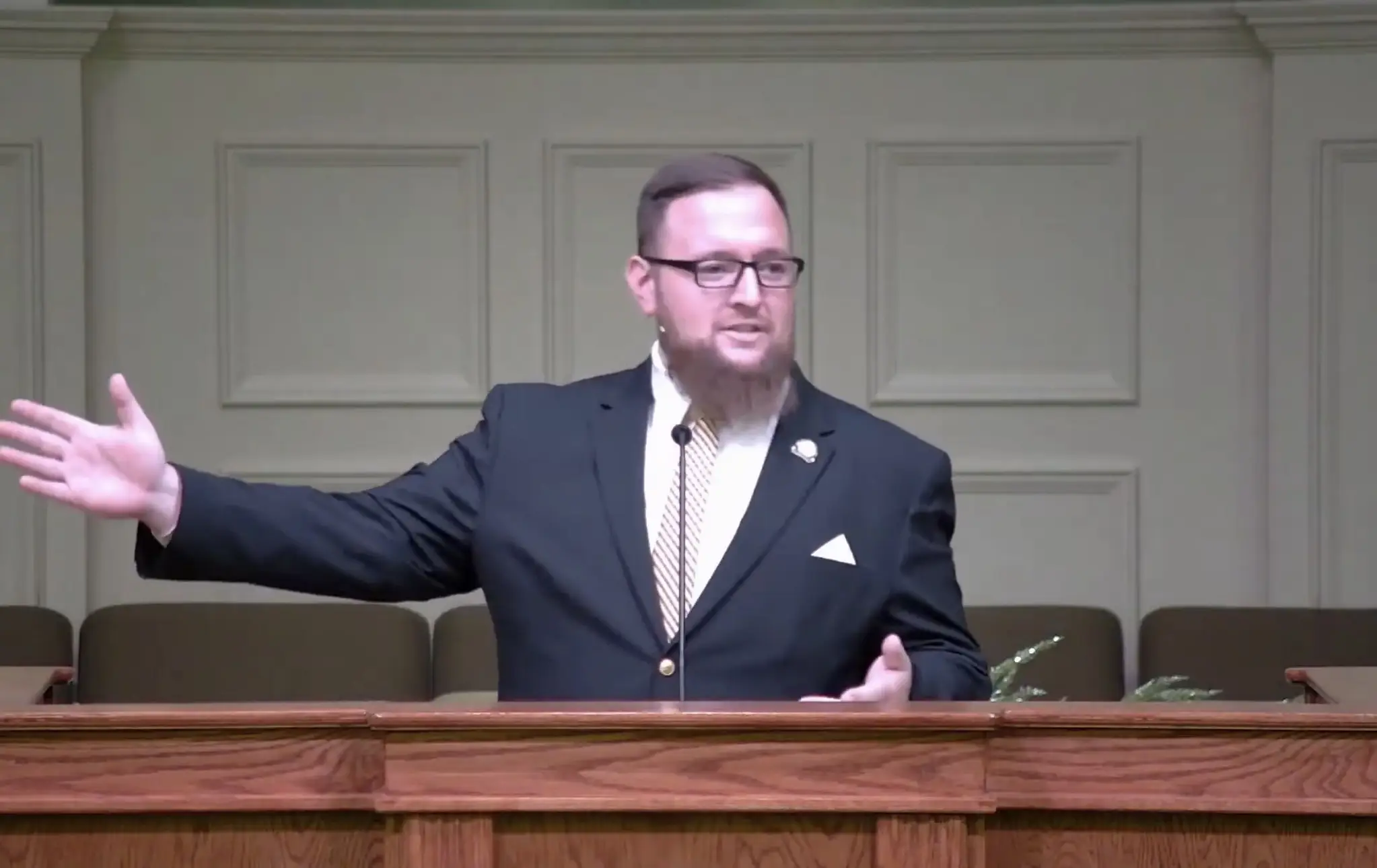Video
“This is the Judgment”
John 3:19-21
Pastor Ryan J. McKeen
05/11/2025
Audio
Transcript
Well, turn with me in your Bibles to John chapter three.
We’ve been in John three for a little while now, a few weeks at least, and this chapter, as we’ve seen, begins with Jesus’s encounter with the religious leader, Nicodemus. Jesus confronted Nicodemus and told him that he needed to be born again. And Nicodemus responded in unbelief. He couldn’t believe what Jesus was telling him. And so, Jesus continues to address this teacher of the law, this teacher of Israel, by explaining from their very Old Testament, we call it the Old Testament, they just called it the Scriptures, but by explaining from his Bible, from Nicodemus’ Bible, that he needed to look to the Son of Man who would be lifted up for sinners.
And then as we came to verse 16, we saw the tone of the words change. Instead of direct and confrontational language, we see more reflective and explanatory and even theological language. And really from verse 16 onward, we see a reflection on what Jesus really is saying to Nicodemus. Really an explanation of what it is Jesus is trying to get Nicodemus to understand. And the theme of these verses from 16 onward is really belief. Really 11 onward. Because we see the word belief in those verses, as I said before, eight times. And so the last few weeks, as we’ve hit this reflection portion of this text, we’ve really kind of slowed down. Because we really need to consider what it is that Jesus is trying to tell Nicodemus.
This is the end of a significant section in John, and it’s meant to make us reflect. We’re supposed to understand this part. And again, as I said, the word believe is all over this section of the text. And after stressing the need for God to do his work of regeneration in the first 10 verses, now the focus is on the responsibility of man to believe. And we come to the last three verses here this morning of this section. And we’re confronted, after hearing about the need to believe, we’re confronted with the reality of unbelief.
There are those who do not believe, and we all know this all too well. We all know people who refuse to believe, who will not. Despite the unbearable consequence of not believing in Christ, there are those who simply will not believe. And the question of our text this morning is why. Why don’t some people believe? Why don’t some people believe?
This is a question asked by many. It’s a question asked by many believers, many of you, I’m sure. Why won’t my friend believe? Why won’t my loved one, my family member believe? Why does anyone not believe? Again, this question is asked by a lot of people. It’s asked by many church growth gurus. in an effort to pump up the numbers in a church to make their church bigger.
Unfortunately, the way this problem is often solved is not actually finding the answer. It’s not trying to find out why people don’t believe. It’s more solved by avoiding belief altogether and giving people other reasons to come to church. And so many churches are filled with people who aren’t there because they believe, but because church fills some sort of social or community need for them. But what about belief?
In 2016, the Pew Research Center conducted a survey of people who no longer believe. no longer believe in whether it’s Christianity or whatever religious affiliation they were. And these are called the nones. When they answer, what religious affiliation are you? They answer, none. And so those people were interviewed asking why. Why are they not affiliated? Or why have they left the religion they were affiliated with? And about 50% of those people said they just don’t believe anymore. In reality, they never did. They never did believe. And they give reasons as to why it is they don’t believe anymore and why they’ve left, whether it’s Christianity or whatever.
And these are some of the reasons they give. Many just mention science. The reason they don’t believe anymore is because science, as if that’s a One word answer that can defeat any argument. One person said, well, I’m a scientist now and so I don’t believe in miracles. Others mentioned common sense or logic or lack of evidence as the reason they don’t believe in God or Christianity.
To give some specific answers that responders made, one said, I learned about evolution when I went away to college. So therefore, I don’t believe. Others said, there are too many Christians doing unchristian things. One person quoted Karl Marx and said, religion is the opiate of the people. It’s a crutch. It’s what simple people believe in. Others said, rational thought makes religion go out the window. Or there is a lack of any evidence of a creator or of God. One person even said, well, I’m doing a lot more learning and studying and kind of making my own decisions for myself rather than just listening to somebody else. How noble. What a nice answer. Who told you that?
You see, there are all sorts of reasons people give for why they don’t believe. And these people probably believe their own reasons. They believe what they said. They believe that’s why they don’t believe. They think that these things really are the reason why they don’t believe in a God. But I’ll tell you one thing, every single one of them is wrong. They’re all wrong. Every single one of the reasons mentioned is not the reason people don’t believe. You say, well, how do you know? I know because the Bible tells us why. The Bible tells us why people don’t believe. Our passage today in John 3 answers the question of why people don’t believe.
This message is titled, This is the Judgment, because this is the first phrase of our text this morning. Last time we talked about salvation and judgment as the two destinies for every single person in the world. Either salvation or judgment. There are only two options. As we saw in verses 17 and 18. For God did not send his Son into the world to judge the world, but that the world might be saved through him. He who believes in him is not judged. He who does not believe has been judged already, because he has not believed in the name of the only begotten Son of God. He who believes is not judged. But he who does not believe is judged already.
Unbelievers are in judgment. They are judged already. Their unbelief is judgment. And they will remain in their judgment if they do not turn to Christ. They will receive the just punishment for their sin and eternity in hell under the wrath of God. Because they have not believed in the name of the only begotten Son of God. Because they have not believed in the one who came to take the punishment for those who believe in him. And because they would not believe in him, they will pay for their own sins. Every single sin that has ever been committed will be paid for. Every single sin that you have ever committed or will ever commit will be paid for. Forgiveness is not forgetting that it happened. Because your sin is either paid for by Christ or it will be paid for by you in hell for eternity.
This is why you must believe in the name of the only begotten Son of God. There is only one name given among men by which we must be saved. And the one who took the punishment for sin for all who believe in him is the one in whom we must believe. And that’s where we ended last time. But there’s more reflection here. There’s more reflection in this section of John 3. And that is our passage here this morning, verses 19 through 21. And what we see in our passage today is a division between two kinds of people. And they’re the same people we saw in verses 16 through 18. There we saw a division between believers and unbelievers. And these are the same division with a different name. In this text, we see the ideas of love and hate. Those who come to the light and those who hate the light.
So we’ll see in our text this morning, first of all, the judgment. This is the judgment, number one, in verse 19. And then the rest of verse 19 to 20, we see number two, the first division of people, unbelievers. Unbelievers, those who hate the light. And then in verse 21, number three, we see believers. The two divisions of people that are revealed by the judgment, believers and unbelievers.
So let me read our text this morning, John chapter 3, verses 19 through 21. This is the word of the Lord. And this is the judgment, that the light has come into the world. And men loved the darkness rather than the light, for their deeds were evil. For everyone who does evil hates the light and does not come to the light lest his deeds be exposed. But he who practices the truth comes to the light so that his deeds may be manifested as having been done by God.
This is the judgment. That is our first division of our text here, the judgment. This is the judgment that the light has come in to the world. So here John is explaining from verses 16 to 18 where he’s talking about belief and unbelief. He’s explaining now why some people believe and some don’t. He is describing the kind of judgment that really does happen when the light comes into the world. And it turns out that those who are condemned in this judgment, they’re condemned by what they love. and what they hate. And then there are those who are rescued in this judgment. And they’re rescued only by the grace of God.
This is the judgment. And the word for judgment here is talking about the process of judging. It’s not the verdict or the sentence. It’s talking about this is how believers and unbelievers are revealed. This is how the judgment process works. This is how they are determined, believers and unbelievers. And he says, the light has come into the world. This is how the judgment happens. The light came into the world. And this light metaphor is a familiar one for John. We know that. John has already described judgment using light and darkness. In the prologue, in John chapter 1, verses 4 and 5, he said, in him, in the word, in him was life, and the life was the light of men. And the light shines into the darkness, and the darkness did not overtake it. So here, John, once again, is picking up the light and darkness theme. He does use the metaphor of darkness and light a lot. You see that in his letters, where he explains even further.
1 John 1:5, and this is the message which we have heard from him and declared to you, that God is light, and there is no darkness in him at all. Then in chapter 2 of 1 John, verses 9 and 10, he goes on to say, the one who says he’s in the light and hates his brother. is in the darkness until now. The one who loves his brother abides in the light, and there is no cause for stumbling in him.
You see, that is an explanation of what is being said here in John 3. And so for John, being in the light, it refers to belonging to God, to being on God’s side. John likes to think in binaries. You’re one or the other. There’s no in between. There is no gray area with John. You are one or the other. You’re in the darkness or you’re in the light. You’re not in the shadows. Light or darkness. You are born of God or you are born of the world. And here he uses the light to refer to Christ. The light came into the world.
Again, in John chapter one, he said in verse nine, there was the true light, which coming into the world enlightens everyone. The light coming into the world enlightens everyone. Again, the light is Jesus Christ, and his coming into the world was his coming to become a man, the incarnation. And His coming into the world enlightened everyone. Not in the sense that everyone was enlightened in their understanding and that they understood who He was, but it shone light on everything. It shone light on everyone. Whether they liked it or not, He shone light into the world. And his shining light into the world reveals people for who they truly are. It reveals whether you are his or not.
That’s what our passage goes on to explain. It reveals whether you are his, whether you are the elect, those who were chosen before the foundation of the world. And Jesus, as the true and perfect man, revealed to every man that was in darkness. who they truly are. That is the effect that Christ has on people. He reveals them for who they are. Jesus is the light, and John says that throughout the gospel. Jesus says, I am the light of the world in John 8 verse 12. I am the light of the world. He who follows me will never walk in darkness. but we’ll have the light of life. In the next chapter, John 9, verse 5, while I am in the world, I am the light of the world. Jesus confesses that he is the light of the world.
Following Christ is to walk in the light. It is to walk so that you know where you’re going. If you’re not following Christ, you have no idea where you’re going. You have no idea where you will end up. You might think you do, but you have absolutely no idea where your road leads to. When you follow Christ, you can actually see where you’re going. You’re following the light. It is to walk in a way in which you will not stumble. This is what Jesus gave the disciples as a warning in chapter 12, verse 35. Jesus says to them, for a little while longer the light is among you, so walk while you have the light, so that darkness will not overtake you. He who walks in darkness does not know where he goes. And that’s the truth.
If you’re not in the light, as most people who are not in the light, they think they have it all figured out. They think they know where they’re going, but he who walks in the darkness does not know where he goes. To follow Christ is to be in the light, and to not follow him is to be in darkness. And here in John 3, John says this is the judgment, this very idea. This is the judgment. This is how people are judged. By how they respond to the light. How we respond to the light reveals whether or not we are His. Chosen before the foundation of the world.
You see, some people, they don’t want to think about salvation this way. They don’t want to think about evangelism this way. That shining the light is what brings people to Him. Instead, people think that, no, we need to dim down the light a little bit. It’s too offensive. It’s gonna drive people away. We need to dim the light. We need to get more people to come in first. But they’re not gonna come in if the lights are too bright. Yeah, exactly.
We’re not told to make the light less offensive. We are told to let our light shine. God will do the work of bringing his people to the light. Let your light shine. We just need to shine the light of Jesus to the world. That is why Jesus came. We saw last week in verse 17, Jesus was not sent into the world to bring judgment, but to bring salvation. But once again, here we see that although he came to bring salvation, that necessarily brings judgment by the way people respond to him.
So this is the judgment that the light came into the world. Sort of an opening statement, and it’s the first division of our text. And now we see the responses. The responses people have to him. You see, the judgment is seen in how people react to the light. And the first response we see is that of unbelievers. The first thing that we are given in this text is the response of unbelievers. Continuing in verse 19, it says, and men loved the darkness. rather than the light, for their deeds were evil. For everyone who does evil hates the light and does not come to the light lest his deeds be exposed. Men loved the darkness rather than the light. Men hate the light. Creatures of the dark hate the light.
And in John chapter seven, Jesus explains this hate and this idea of people hating him because of their own sinfulness. In John chapter seven, verse seven, he’s talking to his disciples about the hate of the world. And he says, the world cannot hate you, but it hates me. The world hates me because I bear witness about it, that its deeds are evil. This is exactly what John 3 is saying. The world hates Christ because he shows them who they are. The world hates Christ. Unbelievers hate Christ. They hate Christ and they love the darkness because they love their sin.
We began by asking, why don’t people believe? Why don’t people believe in Christ and be saved? And this verse tells us exactly why. This is it. No matter what answer is given for the reason why they don’t believe, people don’t believe because they love their sin. People don’t believe because they love their sin and they hate God. That is why they don’t believe. Every single unbeliever doesn’t believe because they love their sin and they hate God. And no amount of marketing or appeal to felt needs or social or community or entertainment needs will change any of that.
Until God breaks into your life and causes you to be born again, this is where you are. When He removes your heart of stone and gives you a heart of flesh, Then he gives you eyes to see and ears to hear. And then you finally see your sin for what it is. Because the light came into your life and showed you your sin. And it’s an offense against an infinitely holy God. That is what the light reveals. It reveals our sin.
And either you see your sin for what it is, and you run from it. And you flee towards the light. Or you see your sin and you love it. And you want to hide it from people. And you want to hide it from being exposed because you don’t want it to be taken away. You don’t want anyone to know about it because that means you might have to stop. But the ones who see their sin for what it truly is, they come to hate their sin because they love their Savior who died for it. That is what happens to a believer. And that is the only reason why anyone believes.
However, some people choose the darkness. And their condemnation, their judgment, lies in that very fact. That they choose the darkness. They shut themselves up in darkness. They cut themselves off from the light. They hate the light because of what it reveals. It reveals them for who they are. This is the same reason the Bible tells us that fools hate knowledge. We see in Proverbs chapter one speaks a lot about fools and knowledge. Proverbs 1.22, how long oh simple ones will you love simplicity and scoffers delight in scoffing and fools hate knowledge.
Fools hate knowledge because knowledge shows how foolish they are. And we know this reality. All you have to do is pay attention to things going on in the world that fools hate knowledge. The most hated person on any news program is the person that can actually bring some facts and knowledge to the discussion. Why? Because fools hate knowledge. People hate when you reveal to them what they truly are. When you strip away their facade that they put up and the disguise that they put on and the act that they put on for everyone else. Because when the light comes, it shines through all of it.
Sinners hate when you reveal their sin because they love their sin. And sinners love to be immersed in their sin and in their wrongdoing. And they don’t want to be bothered. They refuse to be shaken out of the comfortableness of their sin. It feels good. I don’t want to give it up. They reject the light. And they loved their darkness and they condemned themselves in it. And people preferred the darkness. Men loved the darkness.
That’s another thing to notice here. Nobody forced them into this. Nobody forced them into their sin. Nobody forced them to reject the light and to love their sin. People who hate the sovereignty of God and salvation paint it as though God is just some evil puppet master that forces some people into salvation and forces other people into sin, and that is so far from the truth. Nobody forces them to love their sin. God’s grace allows some people to hate their sin, but loving sin is our natural bent because of our sin nature.
People love their sin, and this is why we often get hostile responses to sharing the gospel. When your coworkers or your family members try to change the subject or shut you up when you start talking about Jesus, that’s why. We get hostile responses when we go witnessing down on First Friday, downtown. And we either get people who just outwardly hate us for being there and they tell us that. That happens sometimes. But most of the time, the people we meet, they’re people who see us, they see we’re a church. We usually have a sign that asks a question like, if you could ask God one question, what would it be? Or something like that, and they see us and they’re coming by, and so they wanna sound religious, and they wanna give us a nice sounding Christian answer, and so they come up with something and so we engage them in conversation.
Or sometimes they’ll tell us about the church they go to already, so we don’t need to talk to you. We don’t need what you’re selling because we already go to a church. And they’re very dismissive in that, and usually it’s one of those church names where you don’t know if it’s a church or a theme park. But when we ask them about sin and the gospel, or this last week we had a question that says, are you a good person? Yes or no? And when you push people on, well, do you know what the Bible says about who is a good person? Or do you know what the Bible says about sin? They scowl. Then they hurry up and walk away without even answering. Or they stop the conversation immediately and move on.
Why? Why do they do that? Because they love their darkness. They love their sin. And when you start talking about the light, about Christ, it’s like you’re shining a bright light into their darkened eyes. They hate it because they love their darkness. But when Christ, when the light of the world shines into a person’s life, it will either break him and lead him to repentance and faith because he sees his sin for what it is, or it will drive him further into the darkness.
Because it is intolerable when our sinful works and thoughts and words and feelings are forced out into the light. It’s intolerable. Sin is so ugly and so hideous that it must remain in darkness. It has to live in deception and lies. You have to lie to yourself about it. That’s how ugly it is. If you knew what your sin was really doing to you, you would never touch it. But you keep it in the dark. And you lie to yourself about what it is. Because the sinful heart hates the light and loves darkness.
This is the inner working in an unbeliever. This is what’s going on, what John is talking about here. They will not come to Jesus, and that is the judgment. Loving darkness and hating the light reveals the guilt of the human heart. It reveals the guilt of why you’re not coming to Jesus. And that is that it lies within us. It’s not forced upon us, it’s within us. We don’t come because we don’t want to come. People don’t believe because they love their sin and they hate Christ. That is the first type of person we see in this passage, in this judgment that has come into the world. But it’s not all we see.
It’s not the only type of person we see. The second type are believers. And we see that in verse 21. But, he who practices the truth comes to the light. so that his deeds may be manifested as being done by God. Notice this division I’ve called believers. And throughout this text, it’s been, you must believe, believe, believe. And in this verse, belief isn’t mentioned. He who practices the truth comes to the light. This is speaking about the believer. This is the result of belief. But how is it seen? How is belief seen? By practicing the truth and coming to the light.
The one who does what the one who is truth commands. The one who loves him and so keeps his commandments. Again, this is exactly what John talks about in the letter of 1 John, chapter 2, verses 3 through 6. He says, by this we know. This is how we know that we have come to Him, come to know Him, if we keep His commandments. That’s how you know. How do you know if you’re a believer? How do you know if you’re a Christian? If we keep his commandments. He goes on, the one who says I have come to know him and does not keep his commandments is a liar. Because he doesn’t know him. The truth is not in him. But whoever keeps his word, truly in him the love of God has been perfected. By this we know that we are in him. The one who says he abides in himself to walk in the same manner that he walked.
You see, abiding or remaining in him and having the truth in us, it is walking in the manner that he walked. This is the result of belief. The one who practices the truth willingly comes to the light. He practices the truth because he speaks truthfully about his sin. He sees his sin truthfully. He knows what it is. And he comes to the light.
See, believers hate their sin. This text is dividing people by what they love and what they hate. And we’ve seen that unbelievers hate the light and love their sin. The opposite is true of believers. They hate their sin and they love the light. The true believer is the one who practices the truth because true saving faith, it shows itself in what he practices, what he does. And it shows that his works, what he does, the way he lives has been done by God. That’s what this verse says. It has been done by God. He comes to the light so that his deeds may be manifested as having been done by God. There are a lot of contrasts here in this verse. Some are explicit and some aren’t.
There is the contrast between the believer and the unbeliever in that one hates the light and one loves it and comes to it. And there’s the contrast that the believer loves the light and comes to Jesus. But the greatest contrast here is that the believer comes by the grace of God and the unbeliever flees by his own sinfulness. The believer comes to Christ in humility, knowing that every good thing that he does is only done by the grace of God. And that means that only by God’s power does anybody come to the light.
Only by God’s grace does anybody believe. So we asked, why don’t people believe? Why don’t people believe? Well, we saw people don’t believe because they love their sin, and they hate God, and they hate Christ, and they are responsible for their response to Him. They remain in their judgment. But why do people believe? Why do people believe in Him? And the answer is, they believe by the grace of God. They believe because of what God has done. The ones who come to Christ only come because of what God has done in them. And this is coming full circle to what Jesus started with, with Nicodemus. It has to be done in you.
Yes, Nicodemus, you must believe. And yes, you must be born again. Both are true. And the light came into the world and with him came judgment. And his judgment reveals. And it reveals that not coming to him is due to the sinfulness. Of our hearts. The sinfulness of human hearts. People love their sin. And so they refuse to come to him. But there are those who do come to him in belief. And it is only by the grace of God working in them.
Which means that God will be glorified no matter what the outcome of a person’s life is. Every single person who has ever been born will glorify God one way or the other. If someone refuses to come to Christ and instead they perish eternally in the judgment of God and they spend eternity under the wrath of God, God’s justice is magnified and God receives the glory because of his justice. And if someone does come to Christ, Because God has worked regeneration in their heart and caused them to believe. God’s grace is magnified. And God is glorified because he has shown grace to some people. Either way, God gets the glory. God will be glorified.
So the question for you this morning is not, will you glorify God? It’s how will you glorify God? Will you glorify Him by magnifying His justice? By enduring the righteous wrath of God for your sin for eternity? Or will you glorify God? by magnifying His grace through coming to Christ in belief. You see, John chapter 3 reveals to us, as we’ve already seen, the truth of God’s sovereignty over salvation. You must be born again. You must be born from above. You must come to the light and reveal that your deeds have been done by God. And it also reveals to us man’s responsibility. Because you must believe. You must believe in the name of the only begotten Son of God. And if you refuse to come to Him, you are revealing that you love your sin. And you hate Christ. And you will be held responsible for rejecting Christ.
So come to him. Come to the light of the world. Come to the one who came into the world to become a man. To live a sinless life that we should have lived. To die a gruesome death that we should have died. And to rise again and defeat sin and death once and for all. And who has now ascended to the right hand of the Father. But who will one day come again to finally judge the world. And to finally reveal those who loved darkness. and those who have come to the light. You see, His first coming was not for the purpose of judgment, but it did bring judgment. Because necessarily, as He comes to bring salvation, those who reject Him are revealed. But when He comes again, the purpose is judgment. The purpose is to finally reveal once and for all, for all eternity, Those who are His, who come to Christ, who love the light, who hate their sin, and those who run from Him. Those who hate the light, and love their sin, and love the darkness.
So come to Him and trust Him as your Savior. And if you have trusted in Christ already, Walk in a manner as He walked. Live your life to reveal that the good works that are done in you are done by God. And shine your light. Shine your light before men. The light that is in you because of Christ. Shine His light before men. Because there are those out there in the darkness who are His. And when the light shines on them, They’ll come to Him. And yes, there will be some who are driven into the darkness, but those who are His, through your shining His light, will come to the light.
Let’s stand and close in a word of prayer this morning. Our Father in heaven, we thank you for this text. We thank you for John 3 that speaks to us so much about salvation, about judgment, and about not only your sovereignty, but our responsibility to come to Christ. Lord, I pray that if there are any here this morning who are still in darkness, who are fighting against Christ, that you would cause them to see their sin for what it is, that your light would shine into their life, and that they would come to the light, that they would turn from their sin, that they would hate their sin, and that they would walk in the light of Christ. God, we thank you for your word. We thank you for how you are revealed in your word. We pray that as we do go from here, that we would bring the light to our neighborhoods, to our families, to our workplaces, so that people would see Christ and that he would have his effect on their life. God, we thank you. We pray all of this in Christ’s precious name. Amen.
